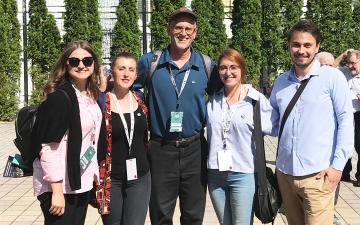
David DeCosse (center) with members of Youth for Peace.
Bosnian Muslim writer Zilka Siljak opened the third international conference of “Catholic Theological Ethics in the World Church: Building Bridges for the Future” with a sobering memory. A student at the start of the war in Bosnia in1992, she recalled at that time marching for peace with no sense whatsoever that all-out war would soon erupt in her country.
I thought often of her words over the course of the conference, which ran from July 26 to July 29 in Sarajevo and was organized primarily by Boston College Jesuit theologian Jim Keenan and a group of other moral theologians. Almost 500 Catholic ethicists from every continent discussed three primary themes: climate change, the dismal state of political leadership in the world today, and what Catholic ethicists can do to respond to these two major challenges.
But whatever was discussed at the conference (and there were many excellent papers), the de facto theme of the gathering was Sarajevo itself. The city is sad and hopeful, tenuous and full of life. On a Friday night, the streets of the old city were packed with old and young; women in burkas and women in all manner of Western dress; rock music and hip hop thumping in clubs in advance of the early morning call to prayer sounding out from minarets; brightly lit brand name stores and back alley warrens of old cafes.
Peace in Bosnia was bought at a price of sectarianism: Sarajevo has a higher percentage of Muslims now (and lower percentages of Serbian Orthodox and Croat Catholic) than during the war. Similar patterns hold for the contiguous areas carved out for the Serbian Orthodox and Catholic Croat populations after the war (that is, each area has even more Serbs and Croats respectively than before the war). Many people I spoke with said that the old myths of persecution and victimization held by each population still run strong in schools and culture. It all adds up to a peace – at least the shooting has stopped – but a peace without much reconciliation.
One of the most powerful moments of the conference responded to the problem of such a tenuous peace: We heard from Youth for Peace, a group of young men and women from Muslim, Serbian Orthodox, and Catholic Croat communities who, as one young woman put it, don’t want to settle for the false peace of living “next to each other” but want to work for the real peace of living “with each other.”
George Orwell said that nationalism makes everyone outside one’s nation into ants – subhuman or just less human and thus fit for contempt or removal or death. The nationalist forces that almost destroyed Sarajevo during the Bosnian war are taking hold again throughout the world and who knows where this will go. The antidote to this, the conference affirmed, are bridges. Siljak noted how much bridges figured in the work of the great Bosnian writer and Nobel Prize Winner Ivo Andric. He said: "Of everything that man erects and builds in his urge for living nothing is in my eyes better and more valuable than bridges. They are more important than houses, more sacred than shrines. Belonging to everyone and being equal to everyone, useful, always built with a sense, on the spot where most human needs are crossing, they are more durable than other buildings and they do not serve for anything secret or bad."
